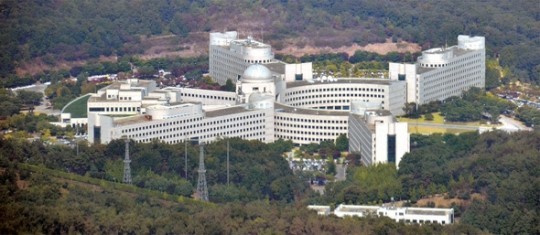 |
|
The National Intelligence Service building
|
The request is an effort to move beyond recent scandals that have plagued the agency
The National Intelligence Service (NIS) submitted a proposed amendment to the National Intelligence Service Act changing its organization name to the “external security intelligence agency” and relinquishing its investigative powers. The NIS reported the amendment to the National Assembly Intelligence Committee on Nov. 29, explaining that its “focus was on reflecting on and breaking with past misdeeds such as political interference.” The name change is intended as “a pledge to break with deep rooted vices and commit our energies purely to national security and protecting the national interest,” it added. In its proposed self-amendments, the NIS eliminated the concept of “domestic security intelligence” (anti-Communist and anti-government subversion activities) – which has been abused in the past as a basis for collecting domestic intelligence and interfering in politics. Instead, it stated the scope of intelligence gathering as restricted to North Korea and other countries; anti-espionage, anti-terrorism, and international criminal organizations; and acts of security infringement linked to North Korea. In the wake of the abolition of the NIS domestic intelligence functions last July, the amendments would also legally bar the establishment of “intelligence gathering organizations with the potential for political interference.” New provisions would punish intelligence collection for the purpose of political interference with fines of up to 10 million won (US$9,200), even if no actual interference occurs. The NIS anti-communist investigation powers would be relinquished to other investigative agencies. The NIS currently holds authority to investigate suspected cases of criminal insurrection and high treason, mutiny and improper code use according to military law, and violations of the Military Secret Protection Act and the National Security Act. With the amendments, the service would maintain only its intelligence gathering authority in these areas, while actual investigation would be left to prosecutors and/or police. The NIS also said it would not be investigating or collecting intelligence in connection with the crimes of praise, incitement, and non-information in connection with antigovernment organizations, which have been cited in the past as toxic provisions in the National Security Act. “Other investigative agencies are fully capable of gathering related intelligence, and concerns have been repeatedly raised about unconstitutionality and the infringement of freedom of conscience,” the NIS said of the provisions. Expansion of intelligence collection for infringements on defense industry, economic activity The amendment plan does not only include provisions limiting the NIS’s authority. It also adds the collection of intelligence related to “infringements of defense industry and economic activity” to the scope of its duties. It is a more detailed specification of areas where the NIS has collected intelligence in the past under the category of “domestic security intelligence.” Also specified were new duties in “preventing and responding to cyber attacks against state and public institutions,” which observers saw as a reflection of anti-cyber terrorism legislation pursued by the Park Geun-hye administration (2013–16) to assign the NIS a cyber-terrorism response control power function. The inclusion of a new regulation stipulating that the NIS director “may request that the heads of intelligence agencies halt their investigations” of NIS staffers in the event of concerns about the leaking of confidential information related to their duties is expected to be a source of controversy as a potentially toxic provision recognizing the NIS as an organization above the law. Potential for abuse still remains “While [the NIS] is relinquishing its investigative powers, the decision to continue collecting ‘intelligence on activities violating security’ could still be used as a basis for widespread surveillance and gathering of domestic intelligence,” warned the NIS Watch Network, an organization with participants including the groups MINBYUN-Lawyers for a Democratic Society and People’s Solidarity for Participatory Democracy. “Given the nature of cyberspace as an environment allowing for secret monitoring, the NIS assumption of cyber security duties increases concerns about the abuse of its authority in areas such as surveillance of civilians,” the network said. The network also noted that the NIS Act amendment reserves the agency’s authority to “plan and coordinate duties related to intelligence and security.” “This provision confers excessive powers on the NIS and encourages its exploitation on behalf of authorities, and must be removed during the National Assembly legislative process,” it insisted. Meanwhile, the National Assembly Intelligence Committee moved the same day to reduce the NIS special activity budget for 2018 by 68 billion won (US$62.6 million). “The 68 billion won included a 50% reduction in the special operations budget, which was the source of the controversy with payments to the Blue House,” explained Democratic Party committee member Kim Byung-kee. In its NIS Act amendment plan, the NIS stated plans to institute a “disbursement control review committee” for more transparent budget disbursement within the agency, with documentary materials provided to the Intelligence Committee for expenditures not requiring confidentiality. By Kim Tae-kyu and Kim Kyu-nam, staff reporters Please direct questions or comments to [english@hani.co.kr]






